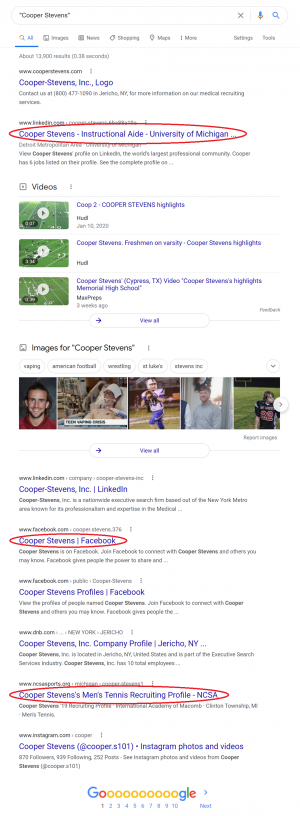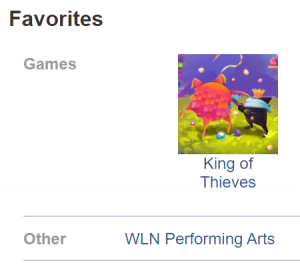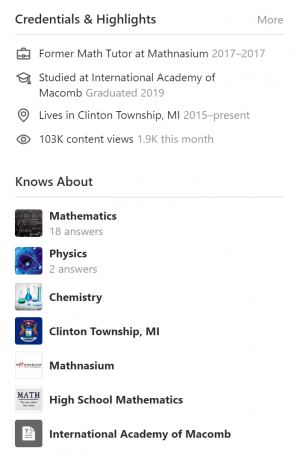Cooper Stevens
Contents
Preface
In the interests of grabbing the attention of potential employers and recruiters, I have spent a good deal of time in the last few years curating personal information into websites and profiles which I have deliberately published publicly on the internet. In my investigation to find information about myself, I was contented to easily find these websites and profiles. However, upon digging further into the search results, I found some remains left behind from my digital footprint (that is, information that I did not curate and publish, but rather resulted from my mere existence in this digital world).
Through this investigation, we will see that the information I deliberately provided in these publications makes up my entire online identity, while my digital footprint functions as a verifier of this identity's authenticity. This observation paired with the fact that I keep these publications up-to-date will allow us to conclude that my online identity is accurate, verifiably authentic, and stable.
Generalizing from this, we will reason that anyone can create their online identity to be whatever they desire, and such a concern will force us to consider strategies for detecting those who do so with malintent.
My Deliberate Online Identity
When I search "Cooper Stevens" on Google, the sources about me that are on the first page of results are my Facebook, my LinkedIn, and my Next College Student Athlete (NCSA) profile. To my delight, these are three of the four profiles that I have taken the time to curate and publish!
My Facebook and LinkedIn profiles inform on my age, education, work history, residences, and a few photos of me. But this is not all of the information these sites provide: both of these sites contain a link to my portfolio website.
My public portfolio website contains much more personal information, ranging from my significant other to hobbies and academic research. As such, it is very reflective of my personality. This is by design so that I can easily refer potential employers to this website so that they may better get to know me as a person (as opposed to just as a candidate).
The next website that comes up is my NCSA profile for tennis. I set this up during high school so that college recruiters could easily find and contact me. I have not worked to keep this profile up-to-date because there has been no reason to, yet all of the information is still surprisingly accurate today.
Since all of these websites and profiles contain information that is always up-to-date (either because the data hasn't changed or because I am always updating it), it follows that the data I have deliberately made public on these sites is accurate, authentic, and stable.
But since I am the one that published these, we must consider the possibility that I am lying for some benefit. Can we verify my deliberate identity's authenticity?
My Digital Footprint Verifies My Deliberate Identity
Apart from the information discussed above, there remains data about me scattered throughout the internet. All of these sites that I will discuss (besides Facebook) were found on pages on or after the fifth page of search results! Needless to say, these were not easy to find, especially when compared to my four curated profiles which could all be found within the first page of search results. In exploring these results, we will find that almost every piece of my digital footprint verifies that which I present in my deliberate identity.
Continuing Our Search for "Cooper Stevens"
The first instance of my digital footprint I found was located at the bottom of my Facebook profile. Here, Facebook displays my "favorite" things which are by-no-means my favorite. As such, these "favorites" fail to verify my deliberate identity. Note, however, that they do not contradict my deliberate identity either.
The next piece of my digital footprint that I stumbled upon was my dormant Quora account. Part of my Quora account that is publicly available is a list of my subject interests. While the discovery that these were not private was surprising, it was not concerning as I had already chosen to express my passions for these topics in my online portfolio. Hence, my Quora profile can be used as verification of my deliberate identity.
Digging deeper into the search results, I was delighted to see that data brokers had very little information that could inform my online identity. The information they had was restricted to a list of my family members[1] and neighbors[2], and two email addresses (one of which is not even mine)[3]. The only correct information I found to be behind a paywall was a personal email address. Still, though, this information about my email and neighbors is ineffectual in trying to get to know me as a person, and hence does not inform my online identity. Meanwhile, the information about my family had already been provided in my online portfolio, further verifying my deliberate identity.
After exhausting the results for "Cooper Stevens", I wanted to continue my search! Since I was able to find my education history by only searching my name, I thought it reasonable to make my search more specific by adding my schools to the query.
Educational History
In this query, I found a long history of my performance in athletic competitions. These included cross-country results from middle-school, tennis results from high school[4][5][6][7], and Disc Golf results at the University of Michigan. While this information is all correct, it can really only inform that I am an athletic person. Note, however, that I had already made this characteristic public in my online portfolio.
The last few pieces of publicly available information that I found came directly from the University of Michigan. This information included my receipt of the 2020 William J. Branstrom Prize[8], and my current work schedule at the University of Michigan’s Math Lab. In my online portfolio, I make public that I received this award and work at the Math Lab, so these discoveries further verify the authenticity of my deliberate identity.
Conclusion
As we have seen, there is a great variety of my personal information publicly available online as a result of my digital footprint. But we have also seen that this information was not only difficult to find, but also very sparse: informative websites were scarce and we never found more than a fact or two on any one site. Moreover, nearly all of the data that could be gathered from my digital footprint is redundant with what I have deliberately published (except for Facebook's incorrect reporting of my "favorite" things).
The difficulty to find data from my digital footprint and this data's redundancy paired with my deliberately published information's abundancy and ease to locate tells us that my deliberately published data would certainly dominate any assessment of my online identity. As a result, we can see that it is to my benefit to curate and publish my own information instead of leaving my online identity to be determined solely by my digital footprint. In doing so, not only is my digital footprint over-shadowed and largely silenced, but I get to choose exactly how my online identity is perceived, as determined by what I choose to publish.
Hence, the power of publishing one's own content about their identity is clear: not only can they make their online identity whatever they want it to be, but they are sure to reach a larger audience (possibly recruiters!) with their easily-accessible publications. However, this is no easy task: there is a good deal of work required to create the content and coordinate it between all public profiles. Then, regular maintenance on this content is required to keep it up-to-date.
Since everyone is able to construct their online identity however they want, it follows that, with sufficient work, anyone can construct a fake persona of themselves online. Attempting to use such a façade to fraudulently obtain something is known as phishing. Such an observation begs the question: why do we search people up online at all if we can't know that the information is representative of their person? Observe that while my digital footprint did not contribute anything new to my online identity that wasn't already in my deliberate identity, it nonetheless verified (or, at least, did not contradict) my deliberate identity. This goes to show that any piece of information deliberately published is likely to be verified by that publisher's digital footprint.
Hence, I suggest that we look for verification in the form of a digital footprint to help detect phishers. This is not to say that anyone with a disconnect between their digital footprint and their published information should be suspected of phishing (my Facebook "favorites", for example, did not verify any part of my published identity!). But rather, this could serve as a warning to approach individuals with inconsistent (or missing) digital footprints with caution.
References
- ↑ Persopo. (2020). Cooper Stevens. Persopo. Retrieved February 18, 2021.
- ↑ Michigan Residents Database. (2019). Cooper Dean Stevens. Michigan Residents Database. Retrieved February 18, 2021.
- ↑ instantcheckmate. (2021). Found: Cooper Stevens. instantcheckmate. Retrieved February 18, 2021.
- ↑ Macomb Daily Sports. (2016, August 26). ROUNDUP: Wins for Utica, Dakota, Cousino. MIPrepZone. Retrieved February 18, 2021.
- ↑ Macomb Daily Sports. (2015, August 31). Summaries for Aug. 31, 2015. MIPrepZone. Retrieved February 18, 2021.
- ↑ Macomb Daily Sports. (2015, August 24). TENNIS RESULTS 8/24. MIPrepZone. Retrieved February 18, 2021.
- ↑ Vest, Mark. (2017, September 25). Chippewa Valley boys tennis wins MAC Blue dual meet championship. C&G Newspapers. Retrieved February 18, 2021.
- ↑ The University of Michigan. (2020, March 15). "The University of Michigan's 97th Annual Honors Convocation". Ann Arbor; The University of Michigan. Page 114. Retrieved February 18, 2021.


